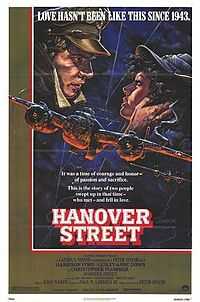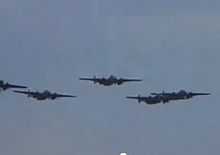Hanover Street (film)
| Hanover Street | |
|---|---|
 Theatrical film poster by John Alvin | |
| Directed by | Peter Hyams |
| Produced by | Paul N. Lazarus III |
| Written by | Peter Hyams |
| Starring |
Harrison Ford Lesley-Anne Down Christopher Plummer |
| Music by | John Barry |
| Cinematography | David Watkin |
| Editing by | James Mitchell |
| Distributed by | Columbia Pictures |
| Release dates | May 18, 1979 |
| Running time | 109 mins |
| Country |
United States United Kingdom |
| Language | English |
| Box office | $3 million[3] |
Hanover Street is a 1979 British-American film, a wartime love story written and directed by Peter Hyams, starring Harrison Ford, Lesley-Anne Down and Christopher Plummer.
Plot
In London during World War II, Lieutenant David Halloran (Harrison Ford), an American bomber pilot serving with the Eighth Air Force based in the United Kingdom, and Margaret Sellinger (Lesley-Anne Down) a British nurse, meet on Hanover Street in a chance encounter during The Blitz.
They meet again two weeks later in a secret assignation on Hanover Street. Although she is married, Sellinger and Halloran rapidly fall in love. She tries to resist, but is drawn to the charismatic American. By contrast her husband Paul Sellinger (Christopher Plummer) is, by his own description, suave, pleasant, but fairly dull. A former teacher, he is now a trusted member of British intelligence.
Halloran is subsequently sent on an undercover mission in Nazi-occupied France to deliver a British agent (Lieutenant Wells). At the last moment, Sellinger takes the place of the agent, and himself joins the mission. His reasons are initially unclear, but he slowly reveals that he wants to prove himself.
Flying over France, his aircraft is hit, with the crew being killed, except for the sole survivors, Halloran and Sellinger. In occupied France, the two have to work together, especially after the agent injures his ankle. Sellinger's mission is to arrive at the German headquarters in Lyon and, posing as an SS officer, photograph an important document that lists the German double-agents in British intelligence. Halloran agrees to help Sellinger. Making contact with the local French resistance, they disguise themselves as German SS officers and steal the documents. SS troops raise the alarm but the pair manage to escape after a lengthy car chase, and make it back to the same farm where they had received assistance. However, they are betrayed by a collaborator and are forced to flee again, pursued by hundreds of Nazi troops, but successfully make their escape.
In London, Sellinger's wife finds out that Halloran and Sellinger are together and have come back home, with her husband wounded, but alive. Going to visit him in the hospital on Hanover Street, she meets Lieutenant Halloran for the last time. They embrace and kiss, and he tells her that he loves her "enough to let her go", she goes in to see her husband, while he goes out into Hanover Street, where the love story had begun.
Cast
As appearing in screen credits (main roles identified):[4]
| Actor | Role |
|---|---|
| Harrison Ford | Lieutenant David Halloran |
| Lesley-Anne Down | Margaret Sellinger |
| Christopher Plummer | Paul Sellinger |
| Alec McCowen | Major Trumbo Marty Lynch |
| Michael Sacks | 2nd Lieutenant Martin Hyer |
| Patsy Kensit | Sarah Sellinger |
| Max Wall | Harry Pike |
| Shane Rimmer | Colonel Ronald Bart |
Production
The film was said to be have been inspired by the 1940 film Waterloo Bridge and "other pix of that ilk."[5] Kris Kristofferson was cast as the male lead in the film. He was intrigued by the aerial sequences he had read in the script, as he had served as a helicopter pilot with the 82nd Airborne Division of the U.S. Army for five years. But then he dropped out of the film.[N 1] Harrison Ford, in Europe on another project, was persuaded to take the lead role.[2][N 2] Lesley-Anne Down replaced Sarah Miles, who dropped out after Kristofferson's departure.[6]
Historical accuracy
Although United States Army Air Forces North American B-25 Mitchell bombers were featured prominently in Hanover Street, the aircraft was a rare sight in England during World War II.[N 3] The typical bomber in use was the Martin B-26 Marauder medium bomber. The filmmakers were forced to use the B-25 due to the few B-26 Marauders in existence.[7]
In the film, Margaret Sellinger emerges from a Piccadilly line tube station called "Hanover Street". In reality there was no such station and, since Hanover Street links upper Regent Street and Brook Street, this would not, in any case, match the alignment of the Piccadilly line – unless there were a fictitious spur similar to that which ran from Holborn to Aldwych from 1907 to 1994.[8]
Aircraft

The aerial sequences were mostly filmed at the by then-disused Bovingdon airfield using five North American B-25 Mitchell bombers flown over to England from USA specially for the filming.[9][10]
| Movie serial # | Nickname | Aircraft type | Actual serial # | Registration # | Disposition |
| 151632 | Gorgeous George Ann / Thar She Blows | B-25J-30NC | 44-30925 | N9494Z | Brussels Air Museum |
| 151645 | Marvellous Miriam | B-25J-20NC | 44-29366 | N9115Z | RAF Museum Hendon |
| 151790 | Amazing Andrea | B-25J-30NC | 44-86701 | N7681C | Destroyed – Hangar Fire |
| 151863 | Big Bad Bonnie | B-25J-30NC | 44-86843 | N9455Z | Grissom Air Museum |
| 151724 | Brenda’s Boys | B-25J-20NC | 44-29121 | N86427 | Museo del Aire, Madrid, Spain |
Reception
Hanover Street benefited at the box office from Harrison Ford's post-Star Wars fame, but received decidedly mixed reviews from critics. Vincent Canby referred to that fame in his review:
"Every now and then a film comes along of such painstaking, overripe foolishness that it breaks through the garbage barrier to become one of those rare movies you rush to see for laughs. What Peter Hyams has achieved with Hanover Street, his new film about a wartime romance set in the London of 1943, is a movie that is almost as funny as Woody Allen's What's Up, Tiger Lily? which, if you remember, was a straight-faced Japanese spy picture that Woody took over and dubbed with a hilariously knuckle-brained English-language soundtrack. The clichés were everywhere, but always just slightly out of place and inappropriate. This pretty much describes the unfortunate method of Hanover Street, which looks as if Mr. Hyams had studied every popular romantic drama, from A Farewell to Arms to Love Affair and Love Story, and then, when he left the screening room, had been hit on the head with a brick....[Ford's] more of a comic-strip character here than he was in Star Wars, which was a live-action cartoon."[11]
Variety said the film is "reasonably effective as a war film with a love story background. Unfortunately it’s meant to be a love story set against a war background." It also notes: "Down again distinguishes herself in a role that doesn’t seem up to her standards, while Ford back in the pilot’s seat again projects an earnest, if dull, presence. Rest of the cast is under-utilized. John Barry has contributed a score that evokes Douglas Sirk's glossy tearjerkers of the 1950s."[5] Film reviewer Leonard Maltin had a similar critique, calling Hanover Street, "slick, but contrived and unconvincing."[12]
The film has developed a following among movie fans and aviation enthusiasts due to the flying sequences.[13] The pairing of Harrison Ford and Christopher Plummer and a plot involving a moving love story, was also notable.[14]
Awards
Patsy Kensit was nominated for, but did not win, the Best Juvenile Actress in a Motion Picture award for 1980 from Young Artists Awards.[15]
References
Notes
- ↑ In a 1978 interview, Kristofferson said that he regretted the 1976 film Vigilante Force and was quitting acting to focus on music. A year later, Kristofferson's acting career resumed and he agreed to star in Heaven's Gate (1980).
- ↑ Harrison Ford was working on Force 10 from Navarone (1978).[2]
- ↑ No USAAF B-25 units were ever assigned to the United Kingdom during World War II.[1]
Citations
- ↑ "Marauder: Mr Martin's Mean Machine: Part Two". Air International, Vol. 34, No. 2, February 1988, pp. 75–82, 94. Bromley, UK: Fine Scroll. ISSN 0306-5634.
- ↑ 2.0 2.1 Jenkins 1998, p. 137.
- ↑ "Harrison Ford." Box Office Mojo. Retrieved: May 21, 2013.
- ↑ "Hanover Street (1979): Full credits." IMDB. Retrieved: June 7, 2008.
- ↑ 5.0 5.1 "Review: “Hanover Street” . Variety, December 31, 1978. Retrieved: May 21, 2013.
- ↑ "Trivia: Hanover Street (1979)." IMDb. Retrieved: March 24, 2012.
- ↑ Donald 1995, p. 177.
- ↑ "Hanover Street."Londontown.com. Retrieved: May 21, 2013.
- ↑ Calvert 1993, pp. 43–44, 46.
- ↑ "North American TB-25N-NC 44-29366/N9115Z/151645/`34037'/8838M museum accession number 84/AF/888." Royal Air Force Museum. Retrieved: May 21, 2013.
- ↑ Canby, Vincent. "Hanover Street, a Love Story: Romantic Mixed Nuts." The New York Times, May 18, 1979. Retrieved: May 21, 2013.
- ↑ Maltin 2009, p. 576.
- ↑ Carlson 2012, p. 152.
- ↑ Calvert 1993, pp. 43–44.
- ↑ "Young Artists Awards." youngartistawards.org. Retrieved: March 24, 2012.
Bibliography
- Calvert, Dennis. "The Mitchells of Hanover Street." Air Progress Aviation, Volume 7, No. 1, Spring 1983.
- Caracalla, Laurence. Harrison Ford. Lyon, France: Fitway Publishing, 2007. ISBN 978-2-75280-244-6.
- Carlson, Mark. Flying on Film: A Century of Aviation in the Movies, 1912–2012. Duncan, Oklahoma: BearManor Media, 2012. ISBN 978-1-59393-219-0.
- Donald, David, ed. American Warplanes of World War II. London: Aerospace Publishing, 1995. ISBN 1-874023-72-7.
- Dolan, Edward F. Jr. Hollywood Goes to War. London: Bison Books, 1985. ISBN 0-86124-229-7.
- Harwick, Jack and Ed Schnepf. "A Buff's Guide to Aviation Movies". Air Progress Aviation, Volume 7, No. 1, Spring 1983.
- Jenkins, Gary. Harrison Ford: Imperfect Hero. New York: Citadel, 1998. ISBN 978-0-80658-016-6.
- Maltin, Leonard. Leonard Maltin's Movie Guide 2009. New York: New American Library, 2009 (originally published as TV Movies, then Leonard Maltin’s Movie & Video Guide), First edition 1969, published annually since 1988. ISBN 978-0-451-22468-2.
- Orriss, Bruce. When Hollywood Ruled the Skies: The Aviation Film Classics of World War II. Hawthorne, California: Aero Associates Inc., 1984. ISBN 0-9613088-0-X.
External links
- Hanover Street at the Internet Movie Database
- Hanover Street at the TCM Movie Database
- Hanover Street (film) at Rotten Tomatoes
- SoundtrackCollector page
- Hanover Street from Mayfair-London.co.uk
| |||||